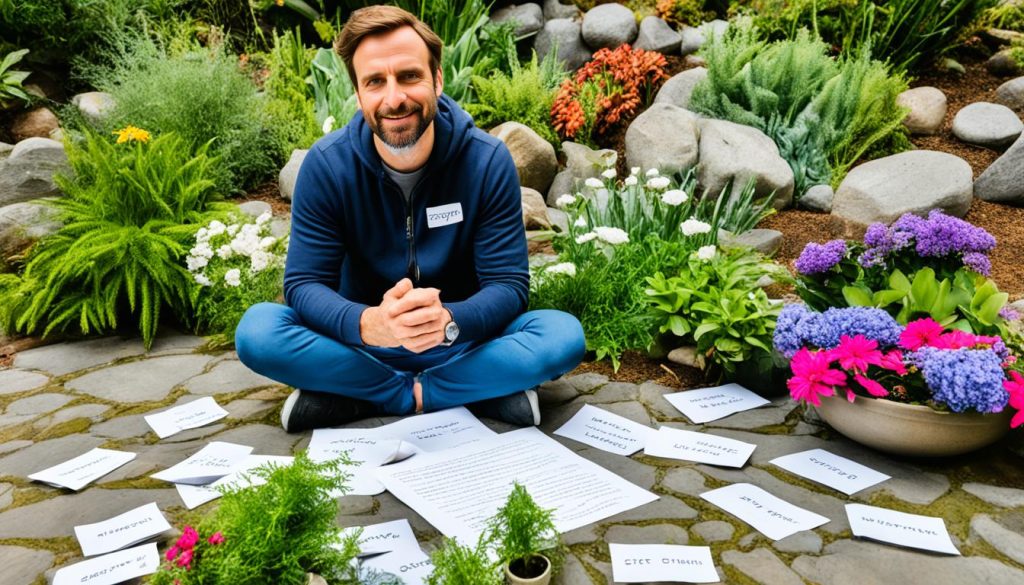Overthinking can be detrimental to a relationship, causing unnecessary stress and anxiety. In this article, we will explore effective strategies for stopping overthinking in a relationship and finding calmness. We will also provide practical tips and techniques for managing overthinking and reducing its impact on the relationship. By implementing these strategies, individuals can experience greater peace of mind and enjoy a healthier, more fulfilling relationship.
Are you looking for advice on how to stop overthinking in a relationship and find calmness? You’ve come to the right place. In the article, we will dive deep into the topic of relationship overthinking and provide you with valuable insights and tips to help you reduce overthinking and improve your relationship.
Are you ready to take control of your thoughts and find peace in your relationship? Let’s get started!
Understanding Cognitive Reframing in Relationships
Cognitive reframing is a powerful technique that can transform the way we perceive and interpret situations in our relationships. By changing our perspective and reframing negative thoughts, we can find greater clarity, understanding, and harmony with our partners.
At its core, cognitive reframing involves challenging and transforming our negative thoughts and beliefs about our partners or our relationship. It allows us to replace unhelpful and destructive thoughts with more positive and constructive ones, enabling us to navigate challenges and conflicts with a healthier mindset.
So, how does cognitive reframing work in relationships? Let’s consider an example:
- You receive a text message from your partner, but they seem distant and uninterested.
- Instead of assuming the worst and spiraling into negative thoughts, such as “They don’t care about me anymore,” try cognitive reframing.
- Reframe the situation by considering alternative perspectives. Perhaps your partner had a rough day at work or is caught up in other responsibilities.
By reframing negative thoughts and changing your perspective, you can choose a more compassionate and understanding interpretation. This shift in mindset opens up the possibility for healthier communication and a deeper connection with your partner.
Applying cognitive reframing in relationships requires practice and self-awareness. It involves recognizing when negative thoughts arise, challenging their validity, and consciously choosing alternative interpretations based on a more balanced and realistic view of the situation.

Ultimately, cognitive reframing empowers us to break free from the cycle of overthinking and negativity that can plague relationships. It encourages us to embrace a growth mindset and approach challenges with optimism and empathy.
In the next section, we will explore how to identify triggers of overthinking in relationships and understand the underlying dynamics that contribute to this pattern.
Identifying Triggers of Overthinking
Overthinking often has specific triggers that can vary from person to person. By recognizing and understanding these triggers, individuals can gain valuable insights into their overthinking patterns and take steps towards managing them effectively. In the context of relationships, it is crucial to identify the triggers that contribute to excessive worrying and analysis. This section will explore some common triggers of overthinking in a relationship, shedding light on why certain thoughts and situations tend to set off the cycle of overthinking.
One common trigger of overthinking is insecurities. When individuals feel insecure about themselves or their relationship, they may be more prone to overanalyzing their partner’s actions, searching for signs of betrayal or rejection. Insecurities can stem from past experiences, personal doubts, or external influences. Recognizing these insecurities and working on building self-confidence can help individuals break free from the cycle of overthinking.
Another trigger of overthinking in a relationship is the fear of rejection. Whether it is the fear of being abandoned, rejected, or not being enough for their partner, this fear can lead to constant questioning and analysis of the relationship. The need for reassurance and validation may arise from this fear, driving individuals to overthink even the smallest signals or interactions.
Past experiences can also act as triggers for overthinking in relationships. If someone has been hurt or betrayed in the past, they may have developed a hyper-awareness of potential signs of deception or disloyalty. This heightened vigilance can contribute to overthinking, as individuals become hypervigilant about any signs that remind them of their past experiences.
By understanding these common triggers of overthinking, individuals can start to recognize when they are falling into the trap of overanalyzing, worrying excessively, and creating scenarios that may not exist. Being aware of these triggers is the first step towards breaking free from the cycle of overthinking in a relationship.
Signs You’re Overthinking in Your Relationship
Overthinking can have a detrimental impact on a relationship. It involves obsessively dwelling on negative thoughts and scenarios, often leading to unnecessary stress and strain. Recognizing the signs of overthinking is crucial in order to address it and work towards a healthier relationship dynamic.

Excessive Worrying
One of the most common signs of overthinking in a relationship is excessive worrying. This can manifest as constant thoughts about the status of the relationship, worrying about the future, and imagining worst-case scenarios. Overthinkers may often find themselves caught in a cycle of negative thoughts and anxiety.
Constant Reassurance Seeking
Overthinkers often seek constant reassurance from their partner. They may need frequent validation and confirmation of their partner’s feelings and commitment. This constant need for reassurance can create strain in the relationship, as it can be emotionally exhausting for both partners.
Difficulty Making Decisions
Overthinking can make even the simplest decisions feel overwhelming. Overthinkers may struggle with making choices, constantly analyzing and second-guessing their decisions. This indecisiveness can lead to frustration and impede the progress of the relationship.
Increased Stress and Tension
Overthinking can contribute to increased stress and tension in a relationship. Constantly dwelling on negative thoughts and scenarios can create a hostile and negative environment. This can lead to arguments, misunderstandings, and a general sense of unease between partners.
Decreased Communication
Overthinking can also impact communication in a relationship. Overthinkers may withhold their thoughts and feelings, fearing judgment or rejection. This lack of open communication can lead to misunderstandings, resentment, and a breakdown in trust.
Diminished Trust
Overthinking can erode trust within a relationship. Overthinkers may constantly question their partner’s intentions and actions, leading to suspicion and doubt. Over time, this lack of trust can damage the foundation of the relationship and hinder its growth and stability.
Recognizing these signs of overthinking is the first step towards addressing the issue. Open and honest communication, practicing mindfulness, and seeking professional help are some effective strategies to overcome overthinking and cultivate a healthier and more fulfilling relationship.
Mindfulness for Overthinking: A Game-Changer
Reducing overthinking in a relationship can be a challenging task. The constant barrage of thoughts and worries can create tension and hinder the ability to fully connect with your partner. However, incorporating mindfulness techniques into your daily routine can be a game-changer when it comes to managing overthinking and finding peace within your relationship.
Mindfulness involves being fully present in the current moment, without judgment or attachment to thoughts or emotions. By practicing mindfulness, individuals can develop a heightened awareness of their mental and emotional state, allowing them to observe their thoughts without becoming overwhelmed by them.
One effective mindfulness technique is meditation. Taking just a few minutes each day to sit quietly and focus on your breath can help calm a busy mind and reduce the overthinking that often plagues relationships. By directing your attention to the present moment and gently bringing it back each time it wanders, you can cultivate a sense of inner calm and clarity.
Another beneficial mindfulness practice is engaging in mindful breathing exercises. Deep, intentional breaths can promote relaxation and help shift your focus away from anxious thoughts. Whenever you feel overwhelmed with overthinking, take a moment to close your eyes, inhale deeply through your nose, hold for a few seconds, and then exhale slowly through your mouth. This simple technique can ground you in the present moment and alleviate the grip of overthinking.

Besides meditation and breathing exercises, mindfulness can also benefit relationships in several ways. By practicing mindfulness, individuals can become more attuned to their partner’s needs and emotions, fostering a deeper sense of empathy and understanding. It allows for better communication and helps prevent reactive responses that often arise from overthinking. Learning to be fully present in the moment also enhances the quality of shared experiences and strengthens the emotional bond between partners.
Reducing overthinking through mindfulness is a journey that requires consistency and patience. It’s important to remember that mindfulness is not about eliminating thoughts or emotions but rather about developing a compassionate and non-judgmental relationship with them. By incorporating mindfulness techniques into your daily routine, you can gain greater control over your thoughts, reduce overthinking, and cultivate a more harmonious and fulfilling relationship.
How to Stop Overthinking in a Relationship?
Overthinking can create unnecessary stress and strain on a relationship. It can lead to doubts, insecurities, and misunderstandings. However, there are effective strategies to help you overcome overthinking and find tranquillity in your relationship.

1. Practice Cognitive Reframing
Cognitive reframing involves challenging and replacing negative thoughts with more positive and realistic ones. When you catch yourself overthinking, take a step back and consider if there’s another way to interpret the situation. Reframe your thoughts by focusing on facts, evidence, and alternative perspectives. This technique can help you develop a more balanced and rational outlook, reducing overthinking tendencies.
2. Engage in Self-Reflection
Take the time to reflect on your thoughts and emotions. Identify any underlying fears or insecurities that may be triggering your overthinking. Understanding the root causes of your overthinking can help you address them effectively. Consider journaling, meditation, or seeking professional guidance to delve deeper into your self-reflection journey.
3. Set Boundaries
Establishing clear boundaries in your relationship can help alleviate overthinking. Communicate openly with your partner about your needs, expectations, and concerns. When both partners are aware of each other’s boundaries, it fosters trust and reduces the need to overthink. Remember, open and honest communication is key.
4. Practice Mindfulness
Mindfulness techniques, such as deep breathing, meditation, and grounding exercises, can help you stay present and focused. By grounding yourself in the present moment, you can prevent your mind from wandering into overthinking patterns. Incorporating mindfulness into your daily routine can promote calmer thoughts and a more peaceful relationship.
5. Seek Support
If overthinking in your relationship becomes overwhelming, seeking support from a trusted friend, family member, or therapist can be beneficial. They can provide an outside perspective, offer guidance, and help you explore additional strategies to manage and reduce overthinking.
By incorporating these techniques into your life, you can stop overthinking in your relationship and create a more tranquil and fulfilling connection with your partner.
How to Let Things Go and Find Tranquillity?
Letting go of negative thoughts and emotions is essential for finding peace and tranquillity in a relationship. Holding onto past grievances and resentments can create unnecessary stress and strain on the relationship. Fortunately, there are various techniques and practices that can help individuals let go of these negative emotions and cultivate a more harmonious environment.
One effective technique for letting go is visualization. By engaging in guided imagery exercises, individuals can imagine themselves releasing negative thoughts and emotions. Visualize these thoughts and emotions as balloons floating away or as leaves being carried away by a gentle breeze. This practice can help in detaching from negative experiences and promoting a sense of lightness and freedom.
Another powerful technique is journaling. By writing down their thoughts and feelings, individuals can gain clarity and insight into their emotions. Journaling allows them to express and release their negative thoughts in a safe and private space. This process can lead to a greater understanding of oneself and promote a sense of relief and release.
Forgiveness is also a crucial aspect of letting go in a relationship. Holding onto grudges and resentments can create a toxic cycle of anger and hurt. By practicing forgiveness, individuals can break free from this cycle and open the door to healing and reconciliation. Through forgiveness, one releases the burden of anger and allows space for compassion and understanding.
Lastly, mindfulness can play a significant role in letting go of negative thoughts and emotions. By practicing mindfulness, individuals learn to observe their thoughts and emotions without judgment or attachment. They develop the ability to let go of negative thoughts as they arise and shift their focus to the present moment. Mindfulness helps cultivate a sense of calmness and acceptance, allowing individuals to find peace in their relationship.
By incorporating these techniques into their lives, individuals can let go of negative thoughts and emotions, paving the way for a more harmonious and peaceful relationship. Letting go is a continuous practice that requires patience and self-compassion. However, by embracing these techniques, individuals can find tranquillity and create a space for love and happiness to thrive.
Techniques to Manage Overthinking
Overthinking can have a detrimental impact on relationships. It can lead to unnecessary stress, anxiety, and misunderstandings. To effectively manage overthinking and reduce its negative effects, there are several techniques that individuals can employ.
1. Thought Stopping
One technique for controlling overthinking is thought stopping. This involves actively interrupting negative or repetitive thoughts when they arise. When you catch yourself overthinking, mentally say “stop” or visualize a stop sign to break the pattern. This technique helps to nip overthinking in the bud and redirect your attention to more constructive thoughts.
2. Grounding Exercises
Grounding exercises can help individuals bring their focus back to the present moment and diminish excessive rumination. Engaging your senses through activities like deep breathing, progressive muscle relaxation, or mindful observation can help shift your attention away from overthinking. By grounding yourself in the present, you can reduce anxiety and regain control over your thoughts.
3. Reframing Limiting Beliefs
Overthinking is often fueled by negative and limiting beliefs. By challenging and reframing these beliefs, individuals can gain a more balanced and empowered perspective. Identify the underlying beliefs that contribute to your overthinking and examine whether they are rational or realistic. Replace them with more positive and constructive thoughts that support healthier relationships.
4. Creating a Thought Journal
Keeping a thought journal can be a useful technique for managing overthinking. Documenting your thoughts allows you to identify patterns, triggers, and underlying emotions associated with overthinking. By gaining insight into your thinking patterns, you can develop strategies to actively challenge and reframe negative thoughts, leading to a reduction in overthinking.
5. Seeking Support
Managing overthinking in relationships can be challenging on your own. Consider seeking support from a trusted friend, family member, or mental health professional. Talking through your concerns and gaining an outside perspective can provide clarity and guidance. Additionally, a therapist can help you develop personalized techniques and strategies to better manage overthinking and promote healthier relationships.
By implementing these techniques for managing overthinking, individuals can regain control over their thoughts and reduce its impact on their relationships. Remember, managing overthinking takes time and practice, but with perseverance and a proactive mindset, individuals can create a healthier and more fulfilling relationship.
Practical Tips to Reduce Overthinking in Your Relationship
Reducing overthinking in a relationship involves implementing practical tips that promote a healthier relationship dynamic and help individuals overcome their tendency to overthink. By taking action steps to address overthinking, couples can create a more positive and balanced connection. Here are some tips to get started:
- Practice open communication: Establishing open and honest communication with your partner is essential for reducing overthinking. Regularly express your thoughts, concerns, and feelings, fostering a safe and trusting environment where both partners can freely express themselves.
- Set realistic expectations: Unrealistic expectations can fuel overthinking in a relationship. Recognize that your partner is not perfect and that conflicts and misunderstandings are a normal part of any relationship. Avoid placing undue pressure on yourself or your partner, and instead focus on realistic and achievable goals.
- Take breaks from overthinking: When you find yourself caught in a spiral of overthinking, take intentional breaks to clear your mind. Engage in activities that bring you joy and help you relax, such as going for a walk, practicing mindfulness, or engaging in a hobby.
- Seek support from a therapist or trusted friend: If overthinking persists and negatively impacts your relationship, consider seeking support from a therapist who specializes in couples counseling. They can provide guidance and tools to help you manage overthinking and improve your relationship.
- Cultivate self-care practices: Prioritize self-care to promote emotional well-being and reduce overthinking. Engage in activities that nourish your mind, body, and soul, such as practicing meditation, exercising, journaling, or seeking out hobbies that bring you joy.
- Challenge negative thoughts: Overthinking often stems from negative thought patterns. Challenge these thoughts by questioning their validity and replacing them with more positive and empowering beliefs. Cognitive reframing techniques can be helpful in reshaping negative thinking patterns.
By implementing these practical tips, couples can actively work towards reducing overthinking and promoting a healthier relationship. Remember, overcoming overthinking takes time and patience, but with consistent effort, you can create a more harmonious and fulfilling connection with your partner.
Conclusion
In conclusion, addressing overthinking in a relationship is crucial for maintaining a healthy and harmonious connection. By understanding the concept of cognitive reframing, we can reframe negative thoughts and beliefs, leading to a more positive and optimistic outlook. Identifying triggers of overthinking enables us to take proactive steps to mitigate their impact and prevent unnecessary rumination.
FAQs
What is cognitive reframing, and how can it help in a relationship?
Cognitive reframing is a technique that involves looking at a situation, thought, or feeling from a different perspective. In a relationship, cognitive reframing can help reframe negative thoughts about your partner or the relationship itself. By changing your perspective and focusing on more positive and realistic interpretations, you can reduce overthinking and improve relationship dynamics.
What are the triggers of overthinking in a relationship?
Triggers of overthinking in a relationship can vary from person to person but often include insecurities, past experiences, and fear of rejection. By identifying these triggers, you can become more self-aware and recognize when you are prone to overthinking. Understanding the patterns and triggers of overthinking is the first step towards managing and overcoming it.
What are the signs that I am overthinking in my relationship?
Signs of overthinking in a relationship include excessive worrying, constant reassurance seeking, and difficulty making decisions. Overthinking can lead to increased stress and tension, decreased communication, and diminished trust in the relationship. Recognizing these signs is crucial in addressing overthinking and working towards a healthier relationship dynamic.
How can I let go of negative thoughts and emotions in my relationship?
Letting go of negative thoughts and emotions is crucial for finding tranquility in a relationship. Techniques such as visualization exercises, journaling, and forgiveness can help release negative emotions and focus on the present moment. By letting go of resentments and past hurts, individuals can create a more positive and harmonious relationship environment.
What are some practical tips to reduce overthinking in my relationship?
Some practical tips to reduce overthinking in a relationship include practicing open communication, setting realistic expectations, and seeking support from a therapist or trusted friend. These actions can promote a healthier relationship dynamic and reduce the impact of overthinking on your well-being.

